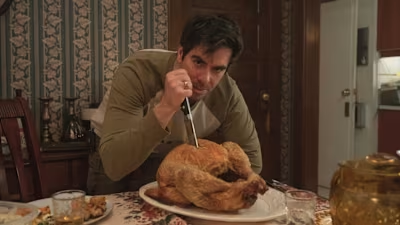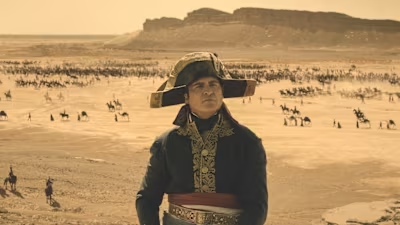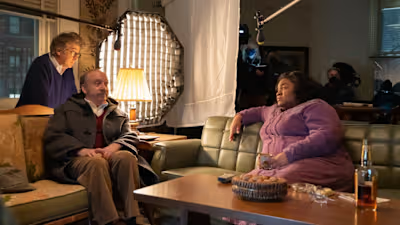With Rustin, George C. Wolfe Brings a Civil Rights Hero Out of …
Like this project
Posted Nov 17, 2023
You might not know a thing about Bayard Rustin, the architect of the 1963 March on Washington that brought the Rev. Martin Luther King Jr.’s “I Have A Dream”
Likes
0
Views
0
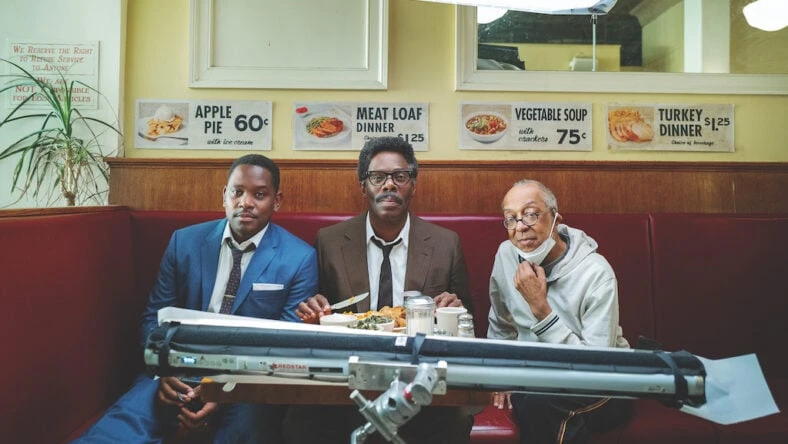
Rustin. Aml Ameen as Dr. Martin Luther King, Colman Domingo as Byard Rustin and George C. Wolfe (Director-Writer) in Rustin. Cr. Parrish Lewis/Netflix © 2023
You might not know a thing about Bayard Rustin, the architect of the 1963 March on Washington that brought the Rev. Martin Luther King Jr.’s “I Have A Dream” speech into the homes of countless Americans. He isn’t as well known as he should be, simply because he was gay.
Rustin, who is played by Colman Domingo in George C. Wolfe’s new Netflix biopic Rustin, was as open as a gay man could safely be in the 1960s, but had to hide aspects of his life for fear that his sexuality would be weaponized against Dr. King. Former President Obama and first lady Michelle Obama are executive producers of the film.
Wolfe believes Rustin is the ideal American — but had to set his wonderment aside on set.
“That’s not my job, to be in awe. My job is to create a work environment so I can hopefully encourage and push and shove and cajole and do whatever I need to do in order to create a safe environment so people do their best, most brilliant work,” Wolfe says.
Wolfe, 69, is awe-inspiring himself: The New York Landmarks Conservancy has declared him a “living landmark” for his outstanding contributions to theater in the city. Among his accolades are three Tonys, starting with one in 1993 for his direction of Angels in America: Millennium Approaches. And his 2020 film Ma Rainey’s Black Bottom won two Academy Awards.
We spoke with Wolfe about finally giving Rustin his due.
Joshua Encinias: Bayard Rustin recorded the album Elizabethan Songs & Negro Spirituals. Hearing him sing “There Is a Balm in Gilead” on a crackling recording is incredibly moving.
George C. Wolfe: He’s full of curiosity, he’s full of vision. He’s astonishing, but I had to approach the film and Bayard as if he were a human being. And now that it’s done, I can allow myself to be in awe of what an astonishing human being he was. He was this West Chester, Pennsylvanian Quaker, valedictorian of his class, but also this athlete. He organized the small Black population at his high school in a boycott that unless they were treated fairly, they wouldn’t play sports. I mean, he’s doing this in his mid-teens. He’s a man of infinite commitment and passion and vision.
The Courage of Bayard Rustin
Joshua Encinias: How was Bayard able to act so fearlessly in the 1930s and ’40s when he was a teenager?
George C. Wolfe: Wherever his heart and his passion and his sense of responsibility led him, that’s where he went. I think he went there fearlessly, because instead of being fueled by fear, he was fueled by responsibility and curiosity. He’s one of those people whose curiosity was so much larger than his fear, and as a result, he did remarkable things. If your curiosity is large enough, you go forward. If your fear is larger, you don’t go forward, and you make cowardly, cheap, easy decisions.
Joshua Encinias: Will you talk about intercutting the scene of Rustin and Elias making love and Elias giving a sermon about love?
George C. Wolfe: I think Elias is a weirdly crucial creative addition to the story, because Elias is based on no one. We created Elias for the movie and so that gave us permission and freedom to imagine the movie as opposed to obeying the story. Elias is really interesting to me because so much of the Civil Rights Movement of that time period was embedded in the Black Baptist church. And it’s very interesting to me that Bayard was raised a Quaker, and his grandmother, who in essence raised him, did not bring fire and brimstone to her judgment about his sexuality.
Whereas Elias, being from the South, he was very much raised in those Southern Baptist traditions. He’s negotiating a relationship with the imprisoning logic of how he was raised, versus what he feels. So in his sermon, he is serving up for himself a redefinition of his relationship to God and Jesus. And as part of the journey he’s on, in terms of liberating himself from those aspects of his religion that were suffocating for him, he has to come up with a new definition of who God is and what God is in relationship to him. Which is crucial to him redefining his relationship to his sexuality because he’s falling in love with Rustin at the same time. But it’s a war between, once again, fear and curiosity, slash desire, and so it’s a breakthrough for that character.
In some respects, it’s a breakthrough for Bayard, not in terms of his sexuality, but in making himself vulnerable to another human being at a time where he’s also made a promise, unfairly to himself, but to Martin Luther King, that he won’t put himself in a compromised position. And the compromised position for him is being human and falling in love! So I wanted to put all of those things together in one room.
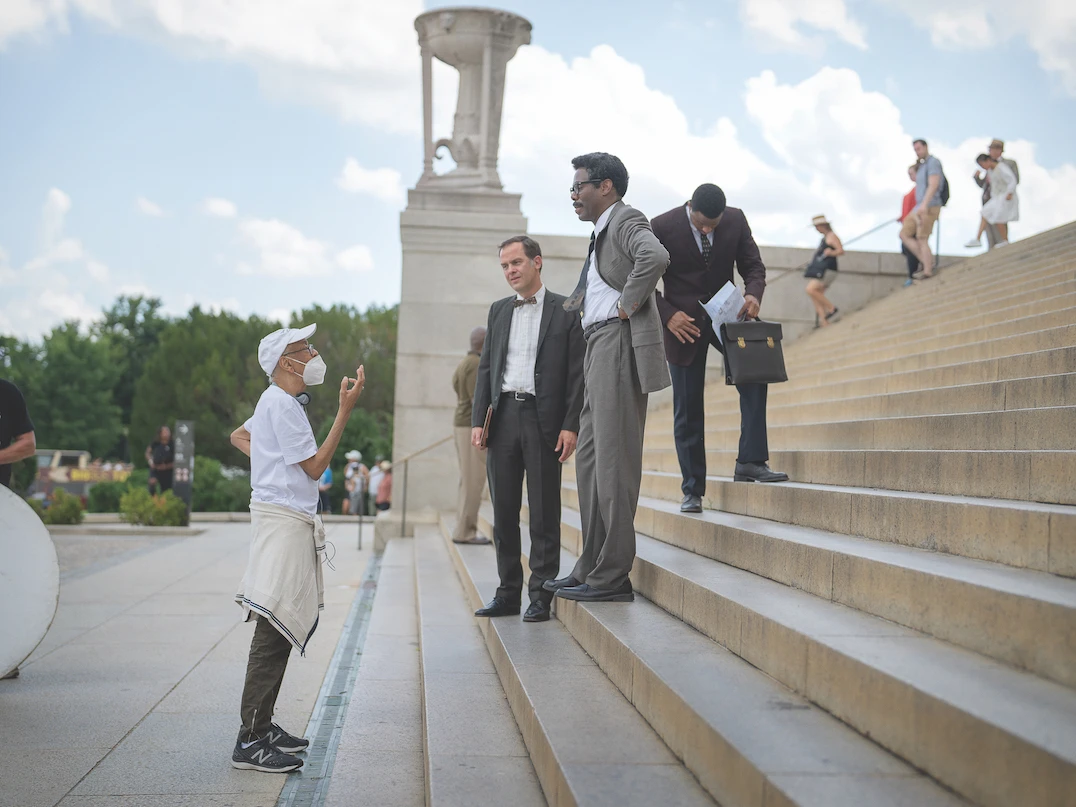
(L to R): Rustin writer-director George C. Wolfe, Cotter Smith as Chief Wells and Colman Domingo as Bayard Rustin. Photo Credit: Parrish Lewis/Netflix © 2023
George C. Wolfe on His Rustin Influences
Joshua Encinias: What influences did you draw from, cinematic or otherwise, for the look of Rustin?
George C. Wolfe: I watched Shadows by John Cassavetes, which is strangely enough about race, in a weird way. I also watched Sweet Smell of Success. There’s this Sammy Davis Jr. movie, A Man Called Adam, which is not great. They all depict Times Square and they’re all in black and white, so you get those glaring lights. I remember at one time having a conversation with Arthur Gelb of the New York Times and he was talking about standing in Times Square in the ’60s and even the early ’70s and seeing policemen go up to Black men and hit the back of their legs really hard and say, “You don’t belong here.” It was so fascinating to hear about it happening so recently.
It got me thinking about who owns the streets. Black people slowly ended up in Harlem, in large part, looking for safety from violence. A lot of homosexual activity in the Village happened behind the trucks and in the clubs that were dark. Those were mob controlled, and could be invaded at any given moment. So the glaring white lights that are used to glamorize the rest of Manhattan are used as a form of violation throughout Rustin. Be it the headlights of a car, or a flashlight pointed at Bayard in Pasadena. That light is a violation because it could expose you to violence.
The film takes place between 8th and 11th avenues in Manhattan, not in Times Square, not in the glaring light. Therefore, at the end of the movie, when we have The March on Washington, it’s these people claiming the streets in broad daylight. They’re claiming Washington, D.C., which was a segregated city in 1963, a former swamp turned segregated city, with these exquisitely beautiful buildings, and claiming it as their own. Rustin’s a journey from those shadows and from the violation of stark light to owning the light, owning the streets, owning the day.
Joshua Encinias: Rustin is also incredibly witty.
George C. Wolfe: I think Bayard used humor because he was very aware of his surroundings. Humor is a brilliant weapon and release. It’s a way to put somebody in their place when you don’t necessarily have the laws on your side. Humor, particularly if it’s executed by someone with keen observational skills, is a way to take command of a situation that theoretically you are not in command of.
I remember at one point, I was talking to Coleman about a scene and I was saying, “If Bayard acted exclusively on his rage, like the many people who feel at times powerless or disregarded, only madness is on the other side of that.” You have to come up with a way to maintain your perspective, your calm, your eye on an agenda, and your dignity. I mean dignity in the sense of being clear-eyed and acutely aware of your power and your worth in the presence of others who have no awareness about you.
Rustin is now streaming on Netflix.
Main image: Aml Ameen as Dr. Martin Luther King, Colman Domingo as Byard Rustin and Rustin writer-director George C. Wolfe. Photo Credit: Parrish Lewis/Netflix © 2023
Share:


